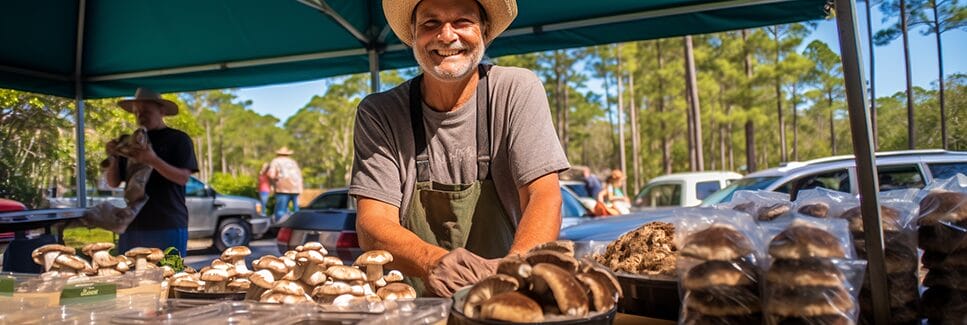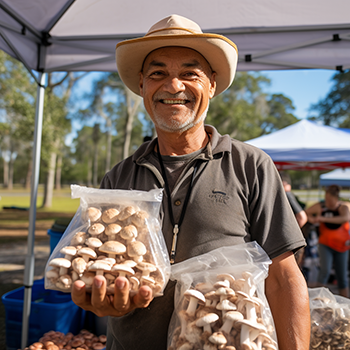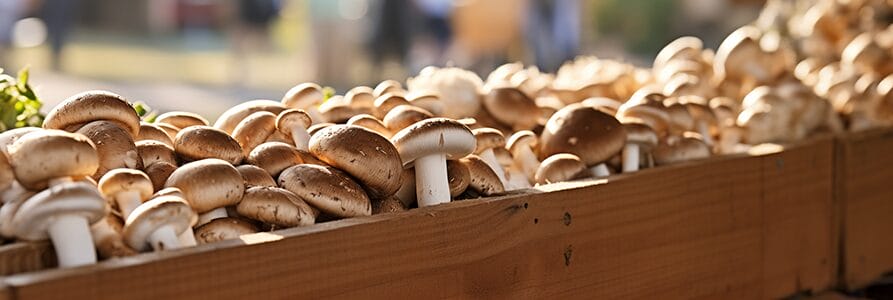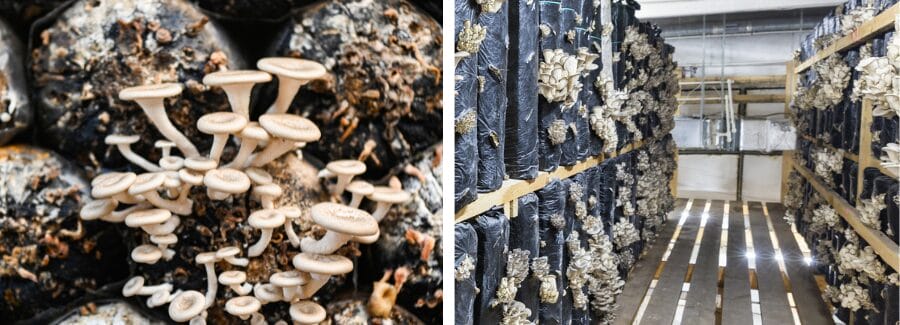

Mushroom Farms in Florida
Mushroom farms in Florida are flourishing across the state, driven by the increasing demand for fresh, organic mushrooms and their numerous health benefits.
While Florida’s landscapes are home to a variety of wild growing edible, “magic,” and even poisonous mushrooms, navigating these options on your own can be risky.
Instead, rely on the expertise of local mushroom farms to provide you with safe, high-quality mushrooms that you can trust!
Let’s take a look at these 3 aspects of mushroom farms in Florida:
- Fresh, locally grown Florida mushrooms and where to buy them
- Mycology and types of mushrooms that are typically grown in Florida
- About the Florida mushroom growing business
Mushroom Shelf-life and Why You Should Buy Fresh and Local
Mushrooms have a limited “shelf-life” where they remain fresh and appealing.
Big companies producing mushrooms for large supermarket chains typically take 3-5 days after harvesting to package, ship then stock the mushrooms in the store.
This means the mushrooms you are looking at buying in the store are in their last days.
However, if you live in Florida and buy directly from a mushroom farmer, you’re likely buying the freshest mushrooms, most likely just harvested, avoiding the days it normally takes to package, ship and stock them in a store, and often coming from different states or countries!

Florida Mushroom Farmers Selling at Local Farmers Markets and Online
- Florida Shroom King: https://floridashroomking.com/
- Fungi Jon: https://fungijon.com/
- Lucky Buddha Mushroom Farms: https://www.luckybuddhamushroomfarms.com/
- Zephyrgills Mushroom Farm LLC: https://www.zephyrgills.com/
- Florida Fresh Mushrooms: https://www.floridafreshmushrooms.com/
- Florida Fungi Farm: https://floridafungi.farm/
Popular Mushrooms Grown in Florida
Oyster Mushrooms (Pleurotus ostreatus):
These are among the most commonly grown mushrooms in Florida. They thrive in the warm, humid conditions and are known for their delicate flavor and velvety texture.
- Flavor Profile: Earthy, slightly meaty with a hint of seafood or anise depending on the variety.
- Growing Time: Typically mature within 3-4 weeks.
- Growing Method: Often cultivated on recycled materials like coffee grounds or straw.
- Uses: Versatile ingredient for various dishes, including stir-fries, soups, and pasta. They can also be grilled or roasted.
Shiitake Mushrooms (Lentinula edodes):
Shiitake mushrooms are prized for their meaty texture and rich, umami flavor. They grow well in Florida’s subtropical climate and are often cultivated on hardwood logs or sawdust blocks.
- Flavor Profile: Rich, umami with a hint of smokiness.
- Growing Time: Take longer to mature, usually around 6-8 weeks.
- Growing Method: Often cultivated on logs or sawdust blocks.
- Uses: A staple in Asian cuisine, perfect for stir-fries, noodle soups, and broths. Their meaty texture makes them a great substitute for meat in some dishes.
Lion’s Mane Mushrooms (Hericium erinaceus):
Known for their unique appearance and health benefits, Lion’s Mane mushrooms have a seafood-like flavor and are used both culinarily and medicinally.
- Flavor Profile: Mild, slightly sweet with a crab-like taste.
- Growing Time: These slow-growing mushrooms can take up to 3 months to mature.
- Growing Method: Typically cultivated on hardwood logs or stumps. Note: Availability in Florida may be limited due to climate.
- Uses: Gaining popularity for their purported cognitive benefits. They can be enjoyed sauteed, steamed, or used in soups and teas.
Reishi Mushrooms (Ganoderma lucidum):
- Flavor Profile: Bitter, woody with a slight coffee or licorice aftertaste. (Not typically recommended for culinary use due to strong flavor).
- Growing Time: Slower growing mushrooms, taking up to 3-4 months to mature.
- Growing Method: Cultivated on logs or supplemented sawdust blocks. Florida’s climate may limit outdoor cultivation.
- Uses: Prized for their adaptogenic properties, which may help the body adapt to stress. Typically consumed as teas, tinctures, or extracts due to the strong flavor.
Cremini Mushrooms (Agaricus bisporus):
Cremini mushrooms are the younger, smaller version of the portabella mushroom. They are popular for their mild, earthy flavor and versatility in cooking.
- Flavor Profile: Mild, earthy with a slightly nutty undertone.
- Growing Time: Typically mature within 5-6 weeks.
- Growing Method: Often cultivated in compost or supplemented sawdust.
- Uses: A popular and versatile choice for everyday cooking. Enjoy them sauteed, stuffed, or sliced raw in salads.
Portabello Mushrooms (Agaricus bisporus)
Portabellas are the mature version of the cremini mushroom. They have a larger cap, a stronger flavor, and a meaty texture.
- Flavor Profile: Earthy, slightly meaty with a deeper, richer taste compared to cremini mushrooms.
- Growing Time: Take longer to mature than cremini mushrooms, usually around 6-8 weeks.
- Growing Method: Cultivated using the same methods as cremini mushrooms.
- Uses: A versatile ingredient for various dishes, including grilling, stuffing, or using as a meat substitute in vegetarian and vegan recipes.
What about Growing Magic Mushrooms in Florida?
Psilocybin-containing mushrooms are growing in popularity across the country, and Florida is no exception. However, in Florida, they are a Schedule I controlled substance. Their cultivation, possession, or use is currently illegal.
Psilocybin mushrooms are not currently legal for cultivation in any state in the US. However, there are two states that have legalized psilocybin-assisted therapy in controlled settings:
* Oregon
* Colorado
Several other states are considering legislation regarding psilocybin, so it’s an area with ongoing developments. You can find up-to-date information on psilocybin laws by searching for “psilocybin legalization map” or similar terms.

About the Florida Mushroom Farming Business
The mushroom farming business in Florida is experiencing growth, driven by the increasing demand for locally sourced, organic produce and a growing population of health-conscious consumers.
This has created a significant market opportunity for mushroom growers. With the combination of favorable growing conditions and high demand, mushroom farming has become an increasingly important and profitable industry, ranked #24 according to the USDA for Florida.
Besides growing and selling fresh mushrooms, many of these companies are creatively also producing products like mushroom extract and powders, dried mushrooms, and mushroom grow kits.
Monetizing Your Mushroom Magic: Ways to Turn Your Hobby into Profit
For those fascinated by the world of mycology, growing mushrooms can be a rewarding and profitable venture. This section explores various ways you can turn your passion for cultivating fungi into a source of income:
- Fresh Mushroom Sales: The most straightforward approach is selling fresh mushrooms directly to consumers at farmers markets, local restaurants, or through online platforms with local delivery options.
- Specialty Mushrooms: Consider cultivating niche varieties like lion’s mane, maitake, or even exotic gourmet mushrooms. These can fetch a premium price at specialty stores or to home cooks seeking unique culinary experiences.
- Value-Added Products: Don’t limit yourself to fresh mushrooms! Explore creating value-added products like dried mushrooms, mushroom powders, or gourmet mushroom jerky to extend your product offerings and shelf life.
- Grow Kits and Supplies: Cater to home mushroom enthusiasts by selling grow kits for beginners or providing specialized mushroom cultivation supplies like spawn, substrate, and growing equipment.
- Educational Workshops and Tours: Share your knowledge and passion by offering workshops on mushroom cultivation techniques, identification, or even culinary uses. You could also host farm tours to showcase your operation and connect with potential customers.


